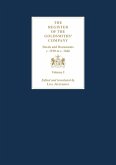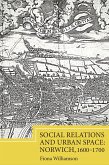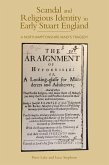Vol 2 of a three-volume edition, provides translations of the Goldsmiths' Company Register of Deeds with full explicatory annotation, and with a clear introduction to both the manuscript and the legal texts contained in it.
The Worshipful Company of Goldsmiths, commonly known as the Goldsmiths' Company, is one of the twelve Great Livery Companies of the City of London. This three-volume edition provides translations of the company's Register of Deeds with full explicatory annotation and with a clear introduction to both the manuscript and the legal texts contained within. Additionally, the volumes contain detailed name and subject indexes.
The company's Register of Deeds has never been fully utilised by historians, but it contains a record copy made from the fifteenth century onwards of the original deeds of the company's acquisitions of property from the reign of King Richard I to the seventeenth century. These deeds reveal much about the precise location of properties and their inhabitants. Wills, often appearing in the Register, help to piece together a social history of the time. Charitable purposes were often the reason for monies or property bequeathed to the Goldsmiths, sometimes of an educational nature, or of almsgiving to the poor, or for the training and support of young goldsmiths and silversmiths. Many documents also concern women, either acting solely in their own name or jointly with a husband, sometimes also appearing as daughters or sisters, providing evidence regarding their legal position during the medieval and early modern period.
The editing and translation of these documents (from Latin and French into modern-day English) will be of great use to historians interested in the buildings of medieval and Tudor London and their use as personal or business premises. But beyond these obvious confines, these so far hidden sources will help to rewrite a social, legal, and economic history of medieval and Tudor London.
The Worshipful Company of Goldsmiths, commonly known as the Goldsmiths' Company, is one of the twelve Great Livery Companies of the City of London. This three-volume edition provides translations of the company's Register of Deeds with full explicatory annotation and with a clear introduction to both the manuscript and the legal texts contained within. Additionally, the volumes contain detailed name and subject indexes.
The company's Register of Deeds has never been fully utilised by historians, but it contains a record copy made from the fifteenth century onwards of the original deeds of the company's acquisitions of property from the reign of King Richard I to the seventeenth century. These deeds reveal much about the precise location of properties and their inhabitants. Wills, often appearing in the Register, help to piece together a social history of the time. Charitable purposes were often the reason for monies or property bequeathed to the Goldsmiths, sometimes of an educational nature, or of almsgiving to the poor, or for the training and support of young goldsmiths and silversmiths. Many documents also concern women, either acting solely in their own name or jointly with a husband, sometimes also appearing as daughters or sisters, providing evidence regarding their legal position during the medieval and early modern period.
The editing and translation of these documents (from Latin and French into modern-day English) will be of great use to historians interested in the buildings of medieval and Tudor London and their use as personal or business premises. But beyond these obvious confines, these so far hidden sources will help to rewrite a social, legal, and economic history of medieval and Tudor London.
Dieser Download kann aus rechtlichen Gründen nur mit Rechnungsadresse in A, D ausgeliefert werden.









